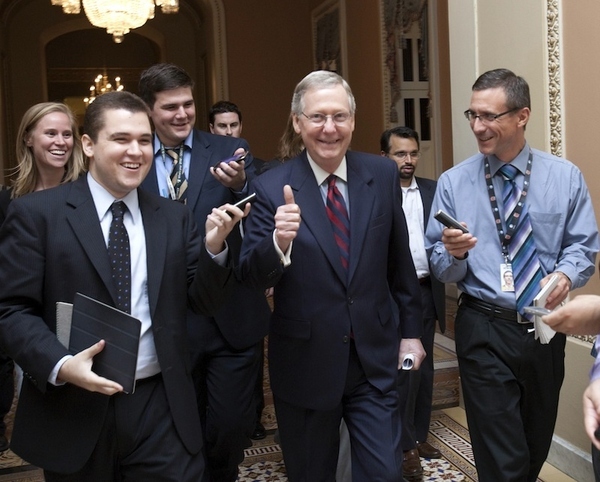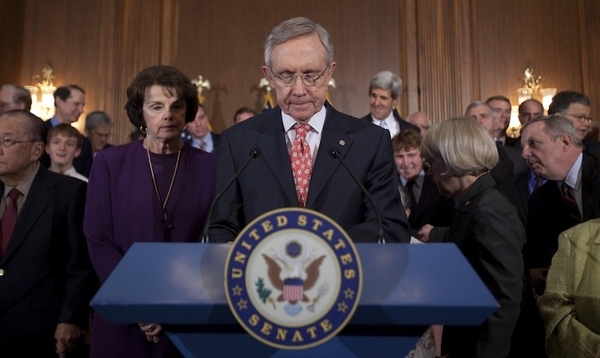Debt Ceiling Agreement Finally Reached
But the Congress still has to vote on it. Our long, national, self-inflicted nightmare is (almost) over.
-

(AP Photo/Manuel Balce Ceneta) WASHINGTON--President Barack Obama and congressional leaders agreed Sunday to cut federal deficits by trillions of dollars over the next decade while raising the nation's debt limit before Tuesday's deadline. "This compromise does make a serious down payment on the deficit reduction we need and gives each party a strong incentive to get a balanced plan done before the end of the year," Obama said Sunday night. "Most importantly, it will allow us to avoid default and end the crisis Washington imposed on the rest of America." The first part of the agreement could cut nearly $1 trillion in federal spending over the next decade, Obama said, while a special legislative committee will look for more cuts. "Everything will be on the table," he said. Obama spoke as financial markets opened in Asia Japan's Nikkei index had climbed nearly 2 percent within an hour of his remarks and eased fears that the United States would default on its debt and perhaps slip back into recession.
-
-
Congressional leaders of both parties said they would present details of the deal to their members on Monday and were confident that both houses would approve the compromise before Tuesday night, when the nation's $14.3 trillion debt limit must be increased. The agreement, forged after weeks of unusually intense, often personal Washington drama, still needs congressional approval. Senate leaders quickly had warm words for the agreement, but House leaders were more circumspect. "I know this agreement won't make every Republican happy. It certainly won't make every Democrat happy, either," said Senate Majority Leader Harry Reid, D-Nev., who signed off on the deal subject to approval of his caucus. "Both parties gave more ground than they wanted to. And neither side got as much as it had hoped. But that is the essence of compromise. And the American people demanded compromise this week." Senate Republican Leader Mitch McConnell of Kentucky praised the agreement. "I think I can say with a high degree of confidence that there is now a framework to review that will ensure significant cuts in Washington spending," he said. "And we can assure the American people tonight that the United States of America will not for the first time in our history default on its obligations."
-

Senate Minority Leader Mitch McConnell, R-Ky., is all smiles as he walks to the Senate floor to announce that a deal has been reached on the debt ceiling on Capitol Hill in Washington, Sunday, July 31, 2011.(AP Photo/Harry Hamburg) House Speaker John Boehner, R-Ohio, had concerns that defense spending could be cut too much. But he told House Republicans on Sunday night: "My hope would be to file it and have it on the floor as soon as possible. I realize that's not ideal, and I apologize for it. But after I go through it, you'll realize it's pretty much the framework we've been operating in." House Minority Leader Nancy Pelosi, D-Calif., said she wanted to see a final agreement in writing. "We all may not be able to support it, or none of us may be able to support it. We are open what to what comes down because the stakes are very high," she said. Congressional leaders spent Sunday in a whirlwind of phone calls, meetings and deliberations, as several scenarios describing deals came and went.
-

Senate Majority Leader Sen. Harry Reid, D-Nev., speaks during a news conference on debt ceiling legislation on Capitol Hill on Saturday, July 30, 2011, in Washington. (AP Photo/Evan Vucci) Democratic and Republican negotiators' chief dispute was over creation of a system for assuring future deficit reduction. But they agreed on several key points: --Spending cuts of $900 billion over 10 years on discretionary items, primarily education, housing and transportation programs that Congress can more easily control. Defense would be cut $350 billion. --No tax increase, although overhauling the tax code would be part of future deficit-reduction efforts. Any automatic cuts would start on January 1, 2013, the same day the Bush tax cuts are due to end. While that suggested the Bush tax cuts could be negotiable, a senior administration official said Obama "is not going to sign something that extends the Bush tax cuts for the wealthy." --A 12-member, bipartisan legislative committee to recommend further spending cuts, with the goal to come up with $1.5 trillion. If it fell short, the rest would be made up with automatic spending cuts, about half from defense and the rest from non-defense programs. Social Security, Medicare and veterans benefits would be exempt. Medicare cuts would be restricted to provider payments, and would be limited. A third increase of $1.5 trillion--expected to be enough to get through next year--would occur after the committee's action, or the automatic cuts, went into effect.
